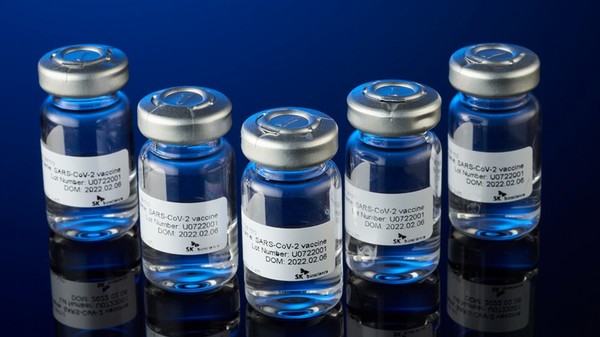Almost no Korean is getting SK Bioscience's Covid-19 vaccine, SKYCovione, because the vaccine release was too late compared to foreign vaccines, government data showed.

According to the 82-week COVID-19 vaccination safety report published by the Korea Disease Control and Prevention Agency (KDCA), 158 people have received SKYCovione as of Sept. 24. The figure is almost invisible compared to over 4.5 million who received the first dose of a Covid-19 vaccine in Korea.
SKYCovione received regulatory approval on June 29, and regulators started using the SK Bioscience vaccine for basic vaccinations on Sept. 5.
SK Bioscience boasted that SKYCovione was the first homegrown Covid-19 vaccine but the meaning of "homegrown" has dimmed by the slow domestic use.
During two weeks between Sept. 11 and Setp. 25, 150 people received SKYCovione.
During the same period, 106,216 people received vaccination with Pfizer's vaccine, and 21,979 and 16,480 received Moderna and Novavax's vaccine, respectively.
Although SK Bioscience argues that the speed of inoculation is getting faster, industry watchers say the company is fighting an uphill battle.
A majority Koreans have already completed the basic vaccination, so not many people are eligible to receive SK Bioscience's vaccine.
As of Aug. 29, only about 2.8 million people, or only 6.5 percent of the Korean population over the age of 18, have not received the vaccination.
Another problem for SK Bioscience is that those who receive the vaccine for primary vaccination cannot enter popular travel destinations such as the U.S. or Japan because SKYCovione is authorized only in Korea.
SK Bioscience is currently undergoing the WHO emergency use listings (EUL) process but has yet to receive approval.
The U.S. continues to impose entry restrictions on foreigners over the age of 18 who have not been vaccinated.
Travelers must present proof that they have completed the primary vaccination at least 16 days prior to arrival. Vaccines recognized in the U.S. are products listed on FDA and WHO EUL.
In Japan, only those who have completed the primary vaccination and first booster shot can enter the country.
Travelers must present either a valid vaccine certificate or a negative result tested within 72 hours from the entrant's departure will be required at the border.
The basic requirements of a vaccine certificate are three shots of vaccines in the WHO EUL, and the vaccine certificate is further subject to specific requirements issued by the Japan Ministry of Health, Labor and Welfare.
"We expect to receive WHO EUL approval by the end of this year," an SK Bioscience official told Korea Biomedical Review. "However, we do not see the travel restrictions regarding vaccination will have an impact on receiving SKYCovione in Korea as most Koreans have already completed their primary vaccination."
The company hopes to export the vaccine to developing countries as soon as it receives WHO EUL, she added.
Despite the company's explanation, the stock price of SK Bioscience has recently been falling due to expected sluggish earnings from a weak demand for the Covid-19 vaccine.
As of 1:00 p.m., SK Bioscience's share stood at 78,600 won ($56), an 8.07 percent drop from the start of this week.
Local investment firms predicted that SK Bioscience's third-quarter earnings would fall short of expectations.
Samsung Securities lowered the target price of SK Bioscience from 120,000 won to 90,000 won and predicted that SK Bioscience's third-quarter sales will be 74 billion won, down 66.5 percent from the same period last year, and operating profit to 17.7 billion won, down 82.4 percent.

